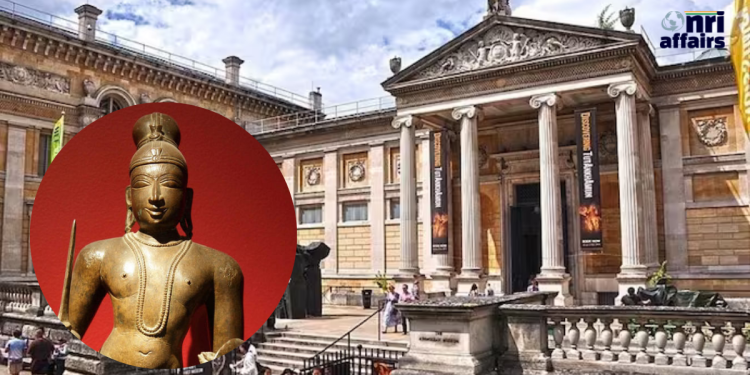Oxford University’s Ashmolean Museum has announced its decision to support the Indian High Commission’s claim for the return of a 16th-century bronze sculpture of Saint Tirumankai Alvar. This revered artifact, believed to have been unlawfully taken from a temple in Tamil Nadu, will be returned to India pending approval from the Charity Commission.
In a statement issued by Oxford University’s Ashmolean Museum, it was announced that on 11 March 2024, “the University Council endorsed a request from the Indian High Commission for the repatriation of a 16th-century bronze sculpture of Saint Tirumankai Alvar. The decision is currently awaiting approval from the Charity Commission.”
The Ashmolean Museum at the University of Oxford procured the 60cm-tall statue of Saint Tirumankai Alvar from the collection of Dr. JR Belmont (1886-1981) via a purchase from Sotheby’s auction house in 1967.
The Ashmolean Museum revealed that it became aware of the statue’s origins through an independent researcher in November of the previous year. Promptly, the museum informed the Indian High Commission about the situation.
Upon receiving a formal request from the Indian government, the museum acknowledged that the bronze idol, suspected to have been looted from a temple in Tamil Nadu, had found its way to the UK through an auction.
Despite acquiring the statue in 1967 in what it believed to be good faith, the museum acknowledged the importance of addressing the concerns raised by the Indian authorities.
This incident aligns with previous instances where stolen Indian artifacts have been repatriated from the UK to India. Notably, in August of the preceding year, a limestone relief sculpture from Andhra Pradesh and a “Navaneetha Krishna” bronze sculpture from 17th-century Tamil Nadu were returned to India following a collaborative investigation involving Scotland Yard’s Art and Antiques Unit.
The idol, depicting a revered saint, is reported to have been illegally taken from a temple in Tamil Nadu several decades ago. Its return marks a crucial step in rectifying historical injustices and restoring cultural heritage.
The Indian High Commission in the U.K. initiated a claim for the bronze figure of Tirumankai Alvar, believed to have been looted from a temple, years ago.
Vijay Kumar, co-founder of India Pride Project, a movement dedicated to reclaiming stolen religious artifacts, expressed optimism about the development. He noted the delays caused by COVID-19 and procedural complexities between British and Indian authorities but emphasized the progress made through social media advocacy.
This move towards repatriation aligns with global efforts by various nations and Indigenous communities to reclaim cultural treasures acquired through questionable means during the colonial era. Oxford University’s decision to return nearly 100 Benin bronzes to Nigeria, looted during British occupation in 1897, serves as a significant precedent in this regard.
The decision to return the ancient artifact follows years of advocacy and negotiations between Indian authorities and the university. Oxford University’s commitment to repatriate the idol underscores the importance of international cooperation in addressing the illicit trafficking of cultural treasures.
Cultural heritage theft remains a pressing concern globally, with countless priceless artifacts unlawfully removed from their places of origin. The return of the bronze idol to India sets a precedent for ethical stewardship and responsible repatriation practices.
The repatriation process signifies a positive outcome in the ongoing efforts to preserve and protect the cultural heritage of nations worldwide. It serves as a reminder of the importance of upholding ethical standards in the management and conservation of cultural artifacts.
The return of the 500-year-old bronze idol to India is anticipated to strengthen cultural ties between the United Kingdom and India while promoting mutual respect and understanding.
The repatriation of the stolen bronze idol from Oxford University to India marks a milestone in the global fight against cultural heritage theft and underscores the significance of international cooperation in safeguarding the world’s cultural treasures.











